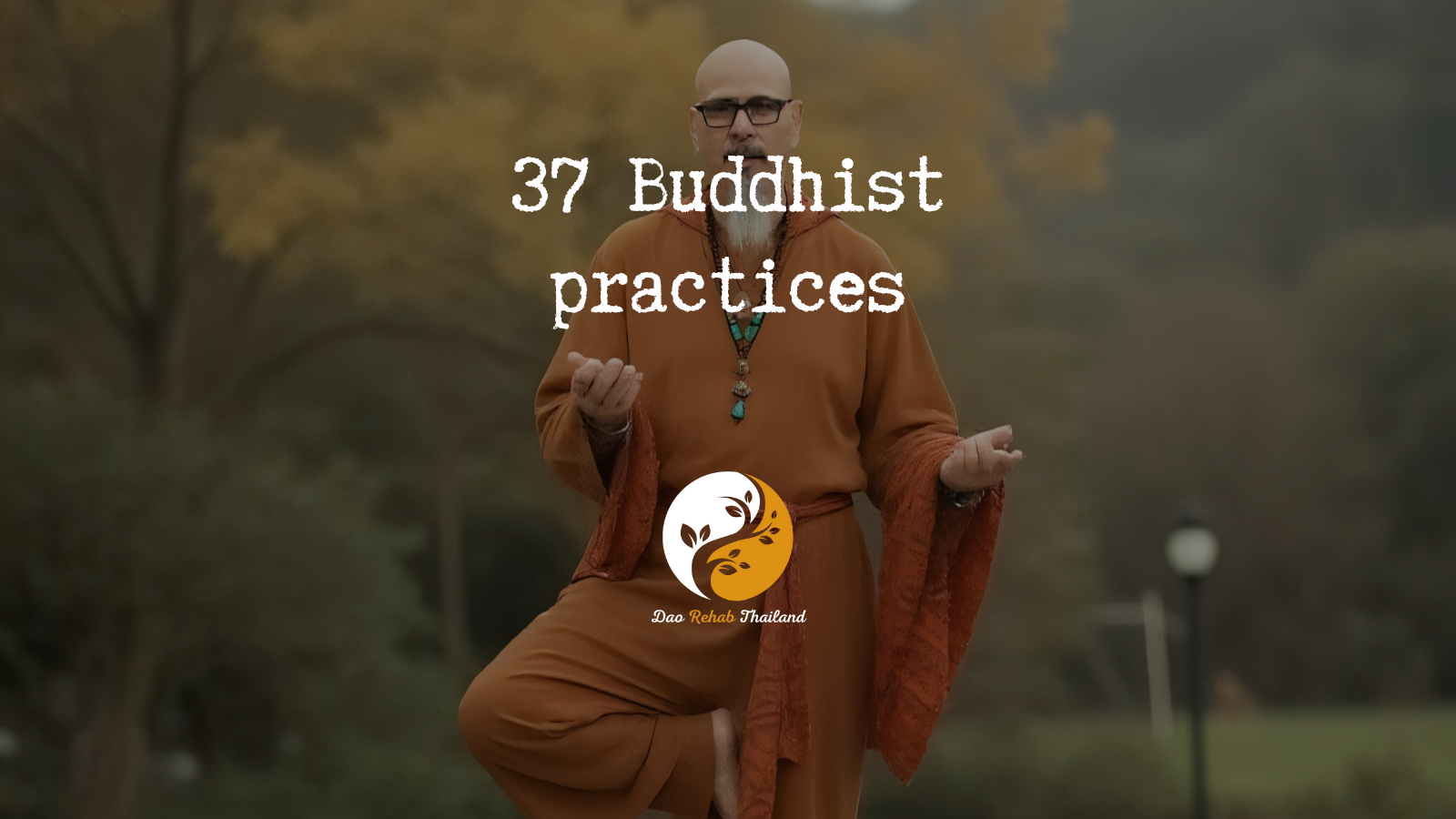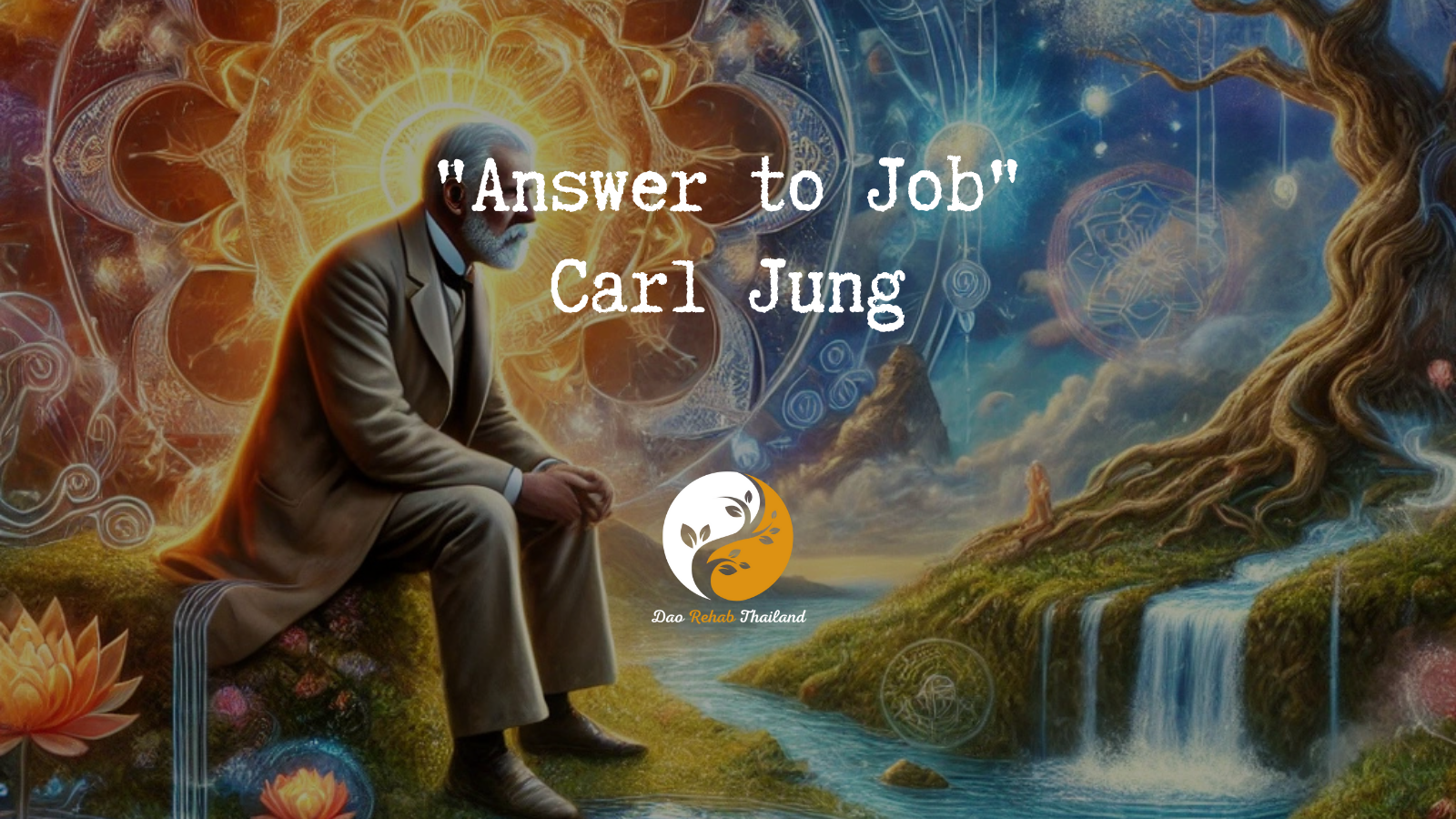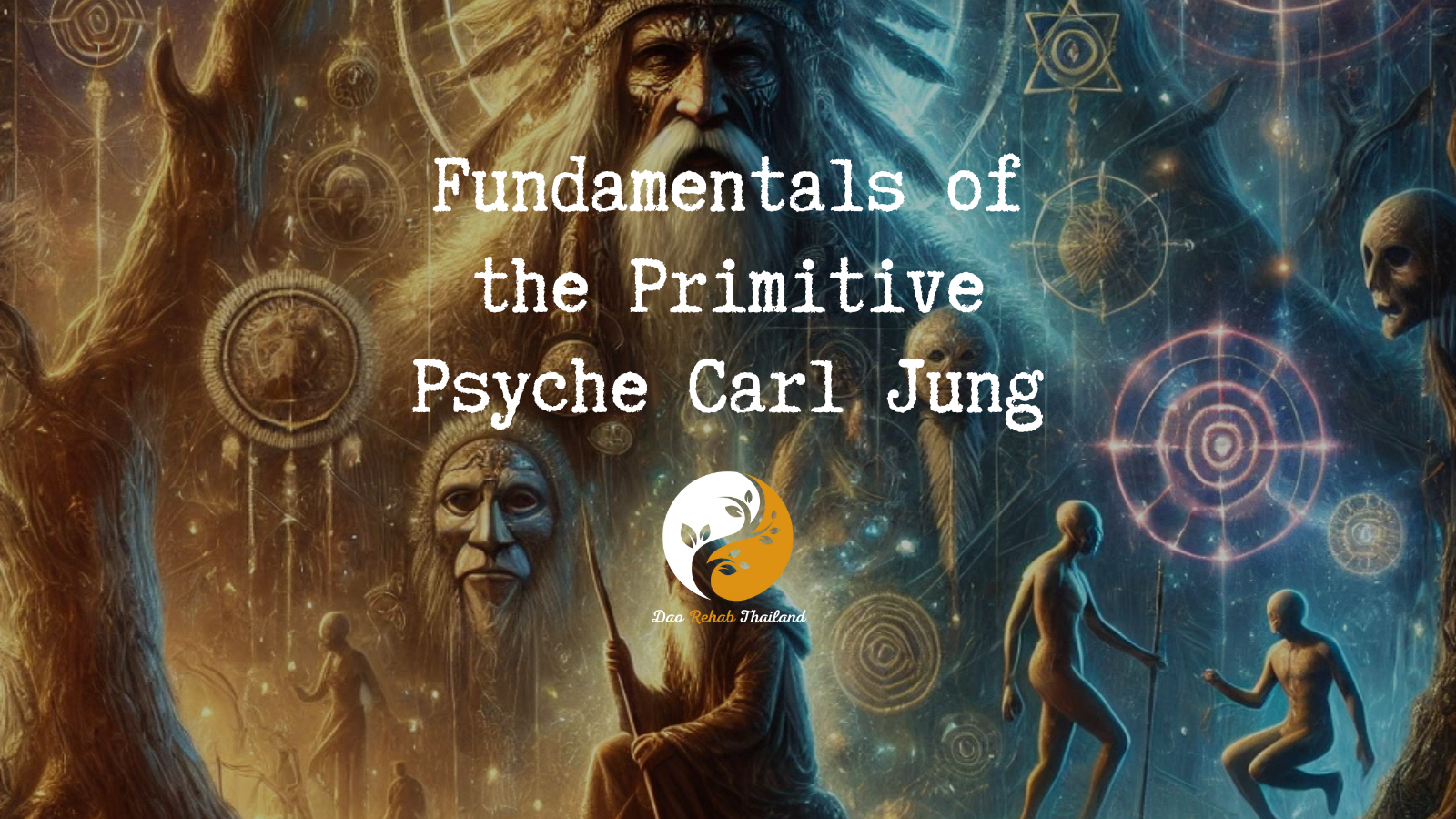
37 Buddhist practices | Holistic rehab in Thailand
37 Buddhist practices
“Turning the impossible into possible”

"Detox from Drugs at a Luxury Holistic Center in Thailand and Israel"

37 Buddhist practices
Namo Lokeshvaraya!
Homage to Lokeshvara!
At all times I bow with body, speech, and mind to the supreme teacher and protector Chenrezig, who, although he recognized that all phenomena do not come and go, strives only for the welfare of transient beings.
The perfected Buddhas, the source of welfare and happiness, arise from the realization of the supreme Dharma; and since this depends on the knowledge of the Dharma practices, I will explain the practices of the Bodhisattvas.
"Holistic Center for Trauma, Addiction, and Mental Imbalance Treatment in Thailand"
“Come to the beginning of your journey to freedom from addiction to alcohol, drugs, and pills, and rediscover your life within the serene embrace of DaoTherapy Rehab in Thailand—where holistic healing meets empowering recovery.”
DaoTherapy Holistic Rehab
Key Elements of Drugs Detox:
Medical Supervision: Drugs detox must be conducted under medical supervision, as the body may experience withdrawal symptoms. These can include nausea, anxiety, muscle aches, and insomnia. A medical team will monitor and manage these symptoms to ensure the patient’s safety and comfort.
Holistic Therapies:
Holistic Therapies: Many detox programs incorporate holistic therapies such as mindfulness, yoga, and meditation to help individuals cope with stress and anxiety during the detox process. These therapies support the mind-body connection and contribute to overall recovery.
Tapering Process
Tapering Process: Drugs detox often involves a gradual tapering of the drug to reduce withdrawal severity. Doctors will slowly decrease the dosage over time to allow the body to adjust to lower levels of the substance.
Psychological Support:
Psychological Support: Like any addiction recovery process, detox from Drugs includes psychological support. This can involve counseling, therapy, or support groups to address the mental and emotional aspects of addiction.
Post-Detox Treatment:
Post-Detox Treatment: After completing detox, continuing treatment is crucial to prevent relapse. This often includes participation in ongoing therapy, group support, and the development of new coping strategies to maintain sobriety.
What are the 37 practices?
1. Now that this rare vessel of freedom and abundance has been attained, listening, contemplating, and meditating without ceasing, day and night, in order to free others and oneself from the ocean of cyclic existence, is the practice of the Bodhisattvas.
2. The consciousness of attachment to loved ones is quenched like water. The consciousness of hatred for enemies burns like fire. The consciousness of ignorance that forgets what to embrace and what to let go is in darkness. Abandoning the land of your ancestors that awakens these three, is the practice of the Bodhisattvas.
3. By leaving harmful places, unpleasant feelings gradually diminish. In the absence of distraction, wholesome activity increases naturally. With clear awareness, understanding of the Dharma and confidence in it grow. Retreating to remote places is the practice of the Bodhisattvas.
4. Long-time companions will part from one another. Wealth and possessions acquired by labor will be left behind. The mind, the guest, will leave the abode of the body. Not to be troubled by these matters of life is the practice of the Bodhisattvas.
5. If, under the influence of the company of your companions, the three poisons increase, the activities of listening, contemplation, and meditation fade, and love and compassion are extinguished, then to withdraw from this bad company is the practice of the Bodhisattvas.
6. When superior spiritual friends are your refuge, your defects come to an end and your virtues increase like the full moon. To cherish superior spiritual friends, even more than your body, is the practice of the Bodhisattvas.
7. How can the gods of the world, who are also bound in the prison of cyclic existence, benefit beings? Therefore, in seeking refuge, to take refuge in the three most precious ones who do not fail is the practice of the Bodhisattvas.
8. The Subduer said that all the unbearable suffering of the three lower realms of existence is the fruit of doing evil. Therefore, to forever abstain from doing evil, even at the cost of one’s life, is the practice of the Bodhisattvas.
9. The pleasure of the three worlds, like a dewdrop on a blade of grass, may pass away in a moment. To strive for the supreme state of unfailing liberation is the practice of the Bodhisattvas.
10. When your mothers, who have shown you affection from time immemorial, suffer, what use is your happiness? Therefore, to develop the consciousness of enlightenment in order to liberate countless beings is the practice of the Bodhisattvas.

contact us
Contact us with your questions
We would love to speak with you! Feel free to reach out with any questions.

get in touch
Schedule a free consultation
Schedule a free consultation with our team and let’s make things happen!
Suffering, whatever it is, comes from the desire for your own happiness.
11. Suffering as it is comes from the desire for your own happiness; the perfected Buddhas arise from the consciousness of caring for others. Therefore, completely exchanging your own happiness for the suffering of others is the practice of the Bodhisattvas.
12. Even if someone, driven by intense desire, steals all your possessions or causes them to be stolen, dedicating your body, possessions, and virtues accumulated over the three ages to that person is the practice of the Bodhisattvas.
13. Even if someone seeks to behead you for no wrong done to you, taking his malicious actions upon yourself through the power of compassion is the practice of the Bodhisattvas.
14. Even if someone spreads words of disapproval of you in the myriad worlds, praising his virtues with loving-kindness is the practice of the Bodhisattvas.
15. Even if a person reveals your faults and speaks harshly to you in front of a large audience, to see him as a spiritual teacher and to honor him with humility – this is the practice of the Bodhisattvas.
16. Even if a person whom you have nurtured with motherly love sees you as an enemy, to redouble your love for him, like the love of a mother for her sick son – this is the practice of the Bodhisattvas.
17. Even if, in the act of his pride, a person equal to you or inferior to you treats you with disdain, to place him, as your spiritual master, with great respect on the crown of your head – this is the practice of the Bodhisattvas.
18. Even if your livelihood is not sufficient and you are treated with disdain, and you are a victim of a fatal illness and evil spirits, without fear to take upon yourself the suffering and evil deeds of all beings – this is the practice of the Bodhisattvas.
19. Even if your fame is great and many people respect you, and your wealth is equal to the treasure of Vishnu, knowing that worldly honor and wealth are unreal, do not let your heart be haughty – this is the practice of the Bodhisattvas.
20. As long as your anger, which is your enemy at home, is not conquered, enemies outside, even if they are defeated, will multiply and break in. Therefore, conquering your mind with the armies of compassion and love is the practice of the Bodhisattvas.
The pleasures of the senses are like drinking salt water.
21. Sense pleasures are like drinking salt water: the more you drink them, the more thirsty you become. To give up without delay all that gives rise to attachment and craving is the practice of the Bodhisattvas.
22. All that appears is but the manifestation of consciousness; the nature of consciousness from the beginning is free from mental structures. Recognizing this, to refrain from engaging the mind in the moments of seeing and being seen is the practice of the Bodhisattvas.
23. Seeing something beautiful, even though it is as dazzling as a rainbow in the summer sky, to see it as unreal and to give up attachment to it is the practice of the Bodhisattvas.
24. Suffering in itself is like the death of a child in a dream. Seeing illusory phenomena as real exhausts the strength. Therefore, in the face of undesirable circumstances, to see them as illusory is the practice of the Bodhisattvas.
25. Since those who aspire to enlightenment are willing to give up even their bodies, renunciation of possessions is a given. Therefore, practicing generosity without expecting reward or good results is the practice of the Bodhisattvas.
26. If, lacking discipline and morality, you cannot act for your own benefit, the aspiration to act for the benefit of others is ridiculous. Therefore, maintaining moral discipline without striving for worldly goals is the practice of the Bodhisattvas.
27. To the Bodhisattvas who aspire to the influence of good qualities, all evildoers are like a precious treasure. Therefore, cultivating patience free from hatred and enmity towards everyone is the practice of the Bodhisattvas.
28. Even the Sravakas and Pratyekabuddhas, who are concerned only with their own benefit, tirelessly toil as if they were trying to put out a fire that has caught fire in their hair. Seeing this, to cultivate joyful perseverance, the source of all good qualities, for the sake of all living beings – this is the practice of the bodhisattvas.
29. Realizing that negative emotions are completely overcome by insight combined with peaceful repose, cultivating concentration that transcends the four formless absorptions is the practice of the bodhisattvas.
30. In the absence of wisdom, enlightenment cannot be attained through the other five perfections. Therefore, cultivating skillful means and wisdom beyond the three circles is the practice of the bodhisattvas.
Harsh words cloud the minds of others and corrupt the conduct of bodhisattvas.
31. Without investigating your faults, there will be and will be actions contrary to the Dharma under the guise of practicing the Dharma. Therefore, investigating your ignorance and eradicating it is the practice of the Bodhisattvas.
32. Speaking about the shortcomings of other Bodhisattvas, which arises from the influence of your negative emotions, corrupts you. Therefore, refraining from dwelling on the shortcomings of those who follow the Mahayana path is the practice of the Bodhisattvas.
33. Since disputes over property and honor impair the activities of listening, contemplation, and meditation, giving up attachment to the homes of friends, relatives, and benefactors is the practice of the Bodhisattvas.
34. Harsh words cloud the minds of others and impair the conduct of the Bodhisattvas. Therefore, refraining from offensive speech that is displeasing to others is the practice of the Bodhisattvas.
35. Once disturbing emotions have become habitual, they are difficult to reverse with antidotes. With constant mindfulness, carrying the sword of the antidotes and destroying negative emotions, such as craving, as soon as they arise, is the practice of the bodhisattvas.
36. In short, in every action, one should ask: “What is the state of my mind?” Realizing the well-being of others through constant awareness and mindfulness is the practice of the bodhisattvas.
37. In order that the positive qualities thus accumulated may alleviate the suffering of all beings, devoting these qualities to enlightenment through the wisdom that recognizes the purity of the three circles is the practice of the bodhisattvas.
Psychological Support:
Psychological Support: Like any addiction recovery process, detox from Subutex includes psychological support. This can involve counseling, therapy, or support groups to address the mental and emotional aspects of addiction.
For those who seek to follow the paths of the Bodhisattvas
For those who wish to follow the path of the Bodhisattvas, I have set forth in the Thirty-seven Bodhisattva Practices what the Blessed Ones have taught about the meaning of the Sutras, Tantras, and their interpretations.
Because of my weak intellect and limited learning, this is not a composition that will please the learned; but since I have relied on the Sutras and the words of the Blessed Ones, I believe that the Bodhisattva Practices are free from error.
However, since a lowly person like me cannot descend to the study of the deeds of the Bodhisattvas, I beg the Blessed Ones to forgive my errors, including contradictions and inconsistent reasoning.
By virtue of the positive qualities that result from this, may all beings, through the consciousness of the supreme enlightenment, relative and absolute, be equal to the protector Chenrezig who is not situated in the poles of existence or peace.
This work was written in the cave of Ngulchu Rinchen by the monk Thugma, the commentator of the scriptures and explanations, for his own benefit and his own benefit.
Notes for translation by passage number:
5. The three poisons: clinging, anger, and ignorance.
7. The three most precious of all, or the three jewels, are the Buddha, the Dharma (his teachings), and the Sangha (the community of those who follow his path).
8. The Subduer – the Buddha, the one who has subdued negative emotions and their origin.
28. Sravaka – one who has attained liberation from suffering (nirvana) by virtue of listening to the Buddha’s teachings, but whose enlightenment is not complete and who cannot bring others to complete enlightenment. Pratikyabuddha – One who has attained liberation from suffering without the guidance of a fully enlightened Buddha, but does not possess the Buddhas’ ability to teach and help other beings attain enlightenment.
29. The four formless absorptions are four imperfect states of meditation, absorption in which leads to rebirth in the “formless realms” rather than enlightenment.
30. The six perfections that lead to enlightenment: generosity, morality, patience, joyful effort, meditative concentration, wisdom. The “Three Spheres” are object, subject, and action, and in the absence of wisdom, each of them is seen as having self-existence.








